Pipelining in TypedProtocols
{-# LANGUAGE BangPatterns #-}
{-# LANGUAGE FlexibleInstances #-}
{-# LANGUAGE RankNTypes #-}
{-# LANGUAGE ScopedTypeVariables #-}
{-# LANGUAGE StandaloneDeriving #-}{-# LANGUAGE DataKinds #-}
{-# LANGUAGE EmptyCase #-}
{-# LANGUAGE GADTs #-}
{-# LANGUAGE PolyKinds #-}
{-# LANGUAGE StandaloneKindSignatures #-}
{-# LANGUAGE TypeFamilies #-}
{-# LANGUAGE TypeOperators #-}module TypedProtocolPipelining where
import Prelude hiding (last)
import Data.Function ((&))
import Data.Kind (Type)
import Data.VoidThe typed-protocols is a framework for writing binary session types in Haskell. It has been developed by IOHK in collaboration with Well-Typed.
For network applications it is common to use some form of latency hiding for performance reasons. Network is utilised best when constant pressure is applied to avoid shrinking of the tcp window (e.g. tcp flow control mechanism). Network utilisation is a balance between keeping the most constrained resource busy - but only just - too busy and delay increases and application responsiveness can drop. For these reasons, the typed-protocol package allows to express protocol pipelining. In addition, protocol pipelining should in principle allow to make less context switches and improve data locality.
In this blog post we will study pipelining starting with a simple ping pong protocol:
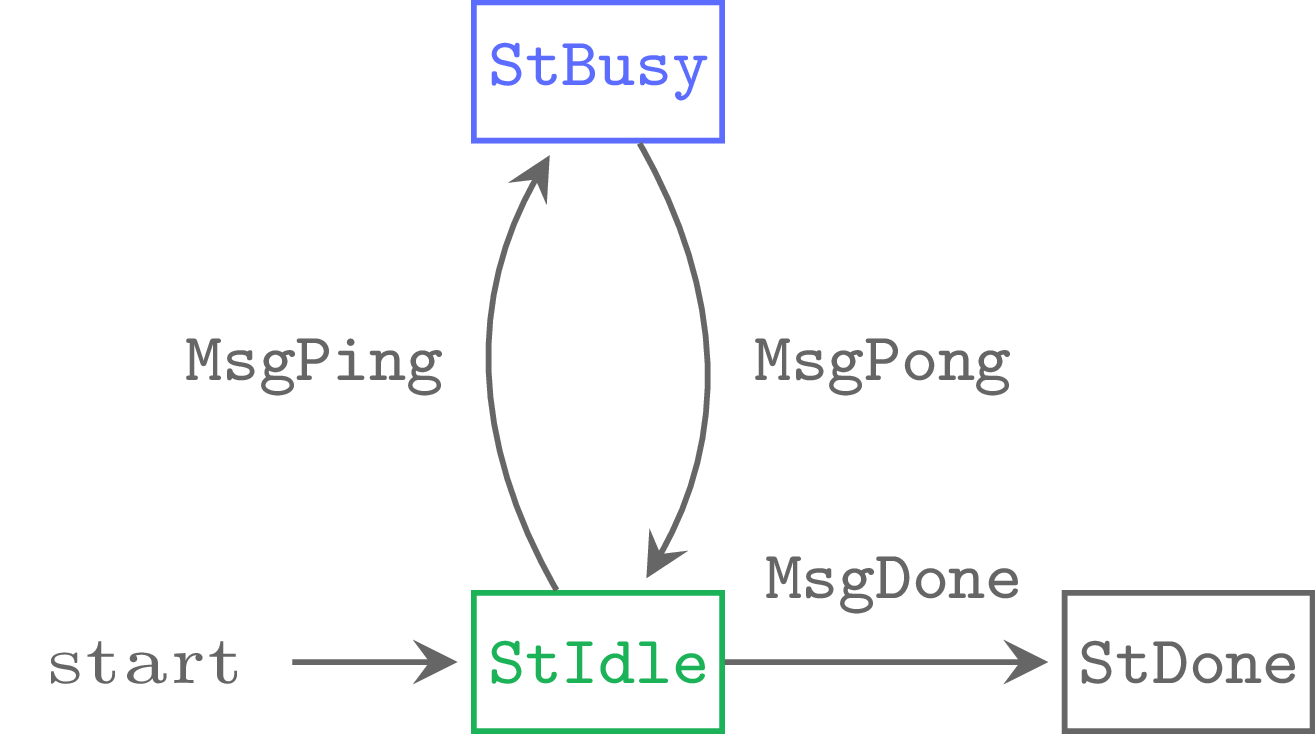
Each arrow designates a message send, the colour of a state signifies
its agency, e.g. who is responsible for sending the message. For example
MsgPing is send by the client (green), it also shifts
agency from client to server: in the StBusy state the
server holds agency and thus is responsible for sending messages. Not
all messages need to transfer agency, we will consider such an extension
to the PingPong protocol later.
The typed-protocols package restricts the way an application executing a protocol can be build and makes it correct by construction. Using type-level programming, one can only construct applications which obey state machine rules faithfully represented by types. A detailed exposition of the package where given at Haskell-eXchange by Duncan Coutts, or my longer workshop at Monadic Party: part 1, part 2, part 3. For example one might construct a client which explores the following state changes:
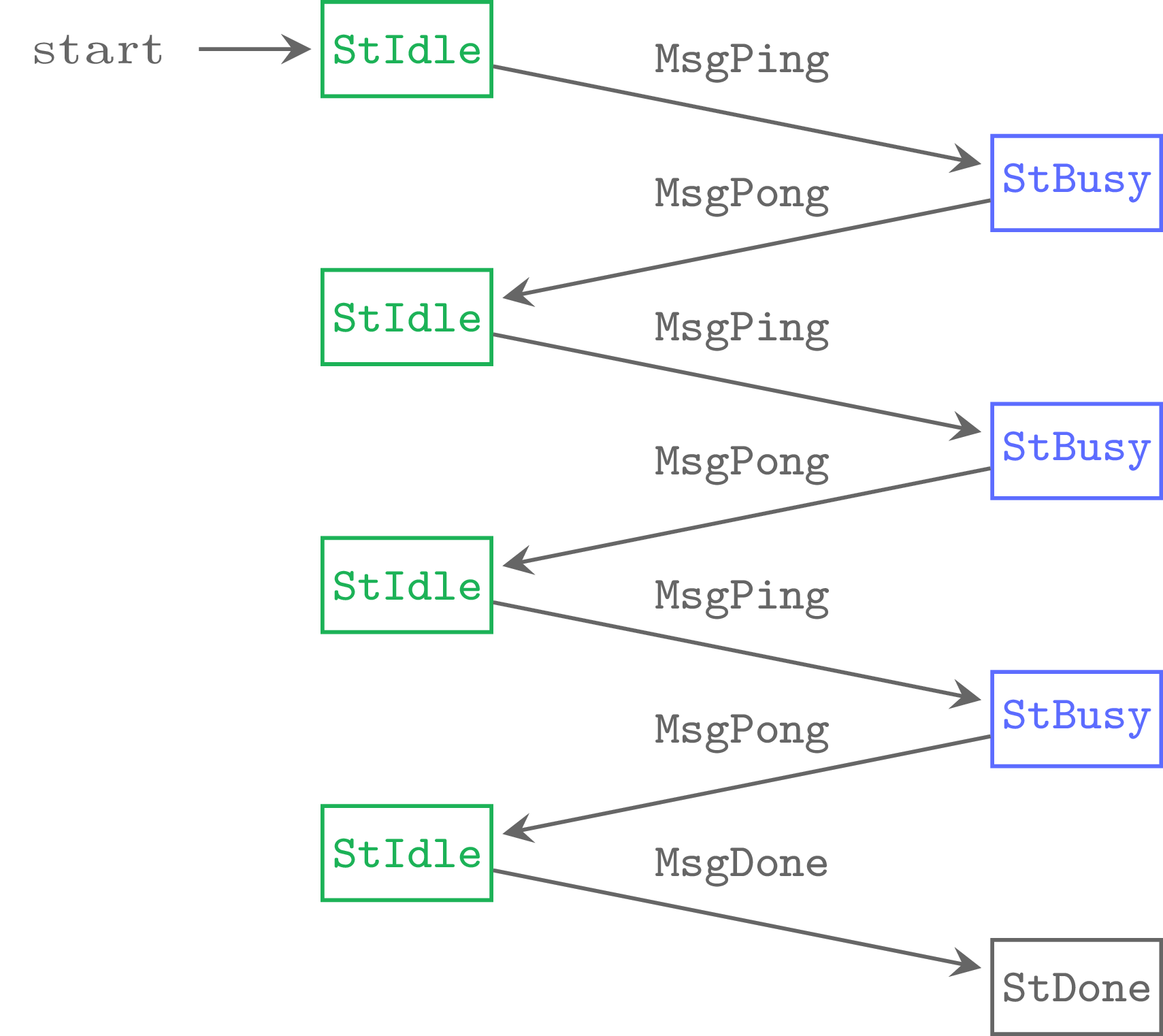
The client will send MsgPing and await for
MsgPong before sending next MsgPing. If we’d
like to pipeline all the MsgPing the communication would
look like:
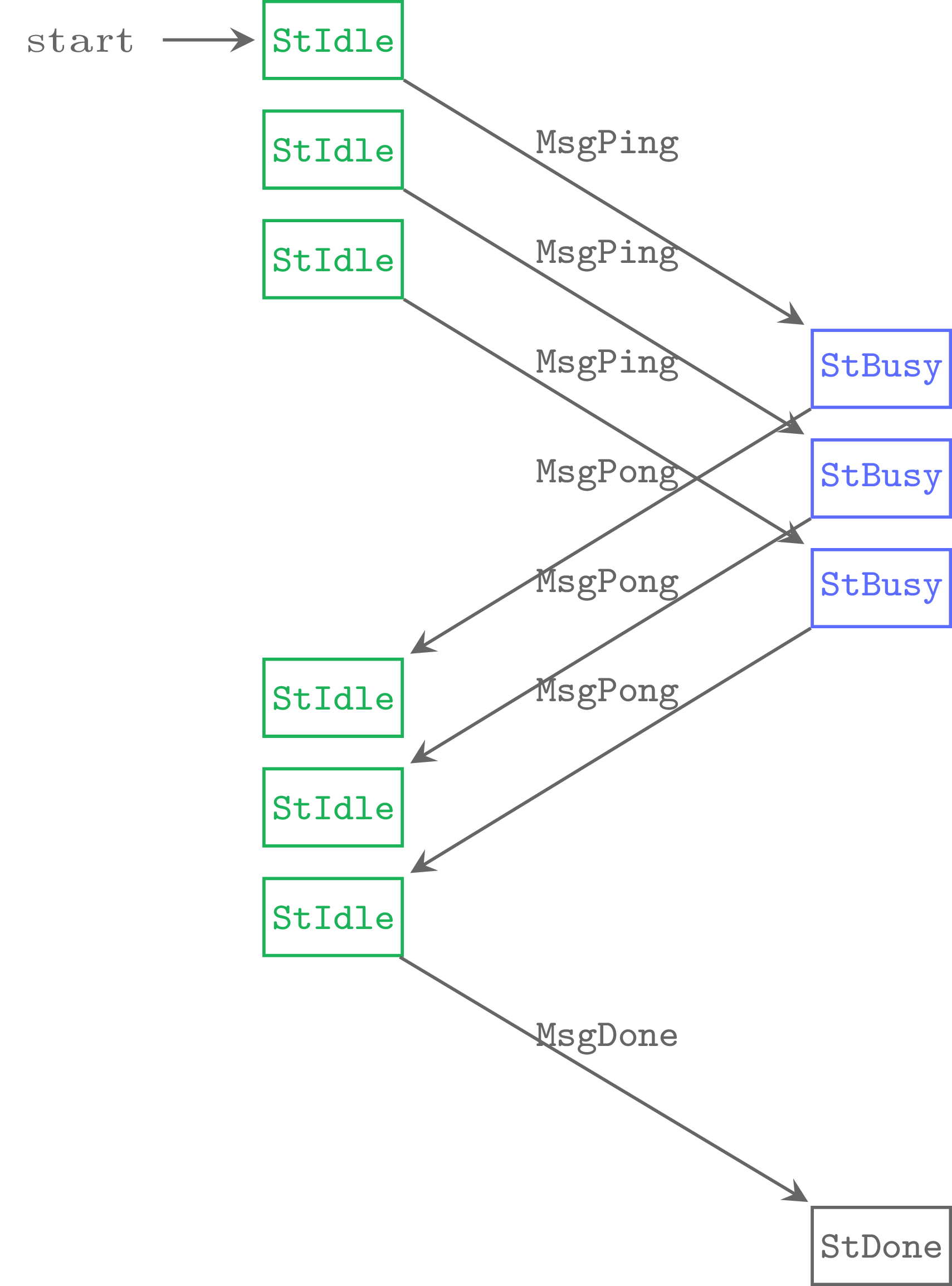
where now we don’t wait for a response before sending next request.
The most important difference between these two diagrams is that the
pipelined version is no longer a continuous flow. Pipelining breaks the
composition of transitions. Instead, we promise to do some of the
transitions at a later time. This delayed processing needs to be managed
by the protocol execution environment. What is worth noting that we must
keep the order of transitions. In the ping pong protocol this is not
readily visible in types as we only collect MsgPong
messages, but one could easily imagine a more complex protocol in which
it would matter. It is not difficult to envision that queues enter the
picture as we need the first-in first-out semantics.
Our current implementation of pipelining in typed-protocols, which in simplified form we will reconstruct for the purpose of this blog post, is using a pair of threads communicating through a pair of queues. The mix of concurrency and type level programming was a neat idea by Duncan Coutts.
In this post we will explore how to re-implement pipelining which does not involve branching and instead use type level programming to give a non-branching recursive api for pipelining, which can be interpreted without the need of concurrency. As we will see, this will improve the way pipelined protocols can be expressed, at the expense of using additional advanced type level programming machinery (since typed-protocols already rely on similar techniques this is not a concern here).
Towards non-pipelined protocol description
This is our first simplest attempt to encode a non-pipelined ping-pong client. The client can be in either of the three states:
data PingPong where
StIdle :: PingPong
StBusy :: PingPong
StDone :: PingPongIt can send either of the messages:
data MessageSimplePingPong (st :: PingPong) (st' :: PingPong) where
MsgSimplePing :: MessageSimplePingPong StIdle StBusy
MsgSimplePong :: MessageSimplePingPong StBusy StIdle
MsgSimpleDone :: MessageSimplePingPong StIdle StDoneNow a client can be encoded as a recursive data type (although this representation is not very useful as it does not allow to do any IO):
data SimplePingPongClient (st :: PingPong) a where
SendMsg :: MessageSimplePingPong StIdle st
-> (SimplePingPongClient st a)
-> SimplePingPongClient StIdle a
RecvMsg :: (MessageSimplePingPong StBusy StIdle
-> (SimplePingPongClient StIdle a))
-> SimplePingPongClient StBusy a
ClientDone :: a
-> SimplePingPongClient StDone aOur initial example client which sends a ping message, awaits for the response, loops it two more times and sends the terminating message can be written as:
simplePingPongClient :: a -> SimplePingPongClient StIdle a
simplePingPongClient a =
SendMsg MsgSimplePing
$ RecvMsg $ \MsgSimplePong ->
SendMsg MsgSimplePing
$ RecvMsg $ \MsgSimplePong ->
SendMsg MsgSimplePing
$ RecvMsg $ \MsgSimplePong ->
SendMsg MsgSimpleDone
$ ClientDone aHow to represent pipelining
The SimplePingPongClient does not allow us to write a
client which pipelines messages.
The idea is that we can separate the sender side from the receiver. Together with a pipelined message we need to present a receiver and a continuation which can send more messages. On the type level we only need to track the number of outstanding pipelined messages. For this we use an inductive natural numbers:
-- | Type level inductive natural numbers.
--
data N = Z | S Ndata SimplePipelinedPingPongClient (st :: PingPong) (n :: N) c a where
-- | Pipeline a single message, together with a receiver and a continuation
-- with incremented outstanding message counter.
--
PipelinedSendMsg :: MessageSimplePingPong StIdle st
-> PingPongReceiver StBusy StIdle c
-> SimplePipelinedPingPongClient StIdle (S n) c a
-> SimplePipelinedPingPongClient StIdle n c a
-- | Collect the receiver result. The continuation subtracts from
-- outstanding pipelined message counter.
--
CollectResponse :: (c -> SimplePipelinedPingPongClient StIdle n c a)
-> SimplePipelinedPingPongClient StIdle (S n) c a
-- | Send terminal message; it is only allowed once we collected all the
-- responses.
--
SendMsgDone :: MessageSimplePingPong StIdle StDone
-> SimplePipelinedPingPongClient StDone Z c a
-> SimplePipelinedPingPongClient StIdle Z c a
-- | Once terminating message was sent, return.
--
PipelinedDone :: a
-> SimplePipelinedPingPongClient StDone Z c a
-- | Receiver; callback which is called on each 'MsgPong' received.
--
data PingPongReceiver (st :: PingPong) (st' :: PingPong) c where
RecvPipelinedMsg :: (MessageSimplePingPong StBusy StIdle -> c)
-> PingPongReceiver StBusy StIdle c-- | Pipelined ping pong client, which for simplicity pipelines two messages
--
simplePipelinedPingPongClient
:: a -- ^ fixed result, for simplicity
-> c -- ^ fixed collected value, for simplicity
-> SimplePipelinedPingPongClient StIdle Z c a
simplePipelinedPingPongClient a c =
PipelinedSendMsg
MsgSimplePing
(RecvPipelinedMsg $ \MsgSimplePong -> c)
(PipelinedSendMsg MsgSimplePing
(RecvPipelinedMsg $ \MsgSimplePong -> c)
(CollectResponse $ \_c0 ->
CollectResponse $ \_c1 ->
SendMsgDone MsgSimpleDone $
PipelinedDone a
)
)This is a simplified version of pipelining api implemented in typed-protocols. There are a few minor problems with this approach:
- the recursive flow of
SimplePingPongClientis broken - in complex protocols one needs to share the type
cbetween all the possibly different pipelining scenarios
The SimplePipelinedPingPongClient still needs an
interpreter. Let’s try to envision how it could look like. In the
network context we can consider that we are given a bidirectional bearer
with guaranteed ordered delivery of messages. Let’s envision its
interface as:
data PingPongChannel m = PingPongChannel {
sendMsg :: forall st st'. MessageSimplePingPong st st' -> m (),
readMsg :: forall st st'. m (MessageSimplePingPong st st')
}For the real implementation look here.
The SimplePipeliendPingPongClient interpreter should be
a function of this type
runPingPongClient :: PingPongChannel m
-> SimplePipelinedPingPongClient st n c a
-> m arunPingPongClient _channel _client = undefinedThe question is how could we deal with PipelinedSendMsg
which branches between receiver and a continuation? The solution in typed-protocols
is to run two threads and communicate between them with a pair of
queues. Once we need to interpret PipelinedSendMsg we would
push the receiver to the queue, send a message through the
PingPongChannel and continue. There would be another thread
that would read that queue and interpret the receiver with:
runPingPongReceiver :: PingPongChannel m
-> PingPongReceiver st st' c
-> m crunPingPongReceiver _channel _receiver = undefinedIt reads from the network, execute the receiver’s callback and write
the result (of type c) to the other queue, from which it
would be available to runPingPongClient when interpreting
CollectResponse (ref. runPipelinedPeerWithDriver).
Protocol description
So far we tried to present a single client in a type safe way. In
general we’d like to be able to represent a wide class of binary
protocols, and for each protocol to be able to construct both sides:
client and/or server. The following Protocol
type class together with auxiliary types PeerRole and
PeerHasAgency defines what is needed to construct a
protocol and proofs of its correctness. So far we’ve only used
Message type from this type class. Each protocol has to
define which side has the agency at each state and which states are
terminating; for this the type class has to provide
ClientHasAgency, ServerHasAgency and
NobodyHasAgency together with some lemmas that ensure
correctness of the provided associated data instances.
class Protocol ps where
-- | The messages for this protocol. It is expected to be a GADT that is
-- indexed by the @from@ and @to@ protocol states. That is the protocol state
-- the message transitions from, and the protocol state it transitions into.
-- These are the edges of the protocol state transition system.
--
data Message ps (st :: ps) (st' :: ps)
-- | Tokens for those protocol states in which the client has agency.
--
data ClientHasAgency (st :: ps)
-- | Tokens for those protocol states in which the server has agency.
--
data ServerHasAgency (st :: ps)
-- | Tokens for terminal protocol states in which neither the client nor
-- server has agency.
--
data NobodyHasAgency (st :: ps)
-- | If the client has agency for a state, there are no
-- cases in which the server has agency for the same state.
--
exclusionLemma_ClientAndServerHaveAgency
:: forall (st :: ps).
ClientHasAgency st
-> ServerHasAgency st
-> Void
-- | If nobody has agency for a state (the state is terminating), there
-- are no cases in which the client has agency for the same state.
--
exclusionLemma_NobodyAndClientHaveAgency
:: forall (st :: ps).
NobodyHasAgency st
-> ClientHasAgency st
-> Void
-- | If nobody has agency for a state (the state is terminating), there
-- are no cases in which the server has agency for the same state.
--
exclusionLemma_NobodyAndServerHaveAgency
:: forall (st :: ps).
NobodyHasAgency st
-> ServerHasAgency st
-> Void
data PeerRole = AsClient | AsServer
type PeerHasAgency :: PeerRole -> ps -> Type
data PeerHasAgency pr st where
ClientAgency :: !(ClientHasAgency st) -> PeerHasAgency AsClient st
ServerAgency :: !(ServerHasAgency st) -> PeerHasAgency AsServer st
type WeHaveAgency (pr :: PeerRole) st = PeerHasAgency pr st
type TheyHaveAgency (pr :: PeerRole) st = PeerHasAgency (FlipAgency pr) st
type family FlipAgency (pr :: PeerRole) where
FlipAgency AsClient = AsServer
FlipAgency AsServer = AsClient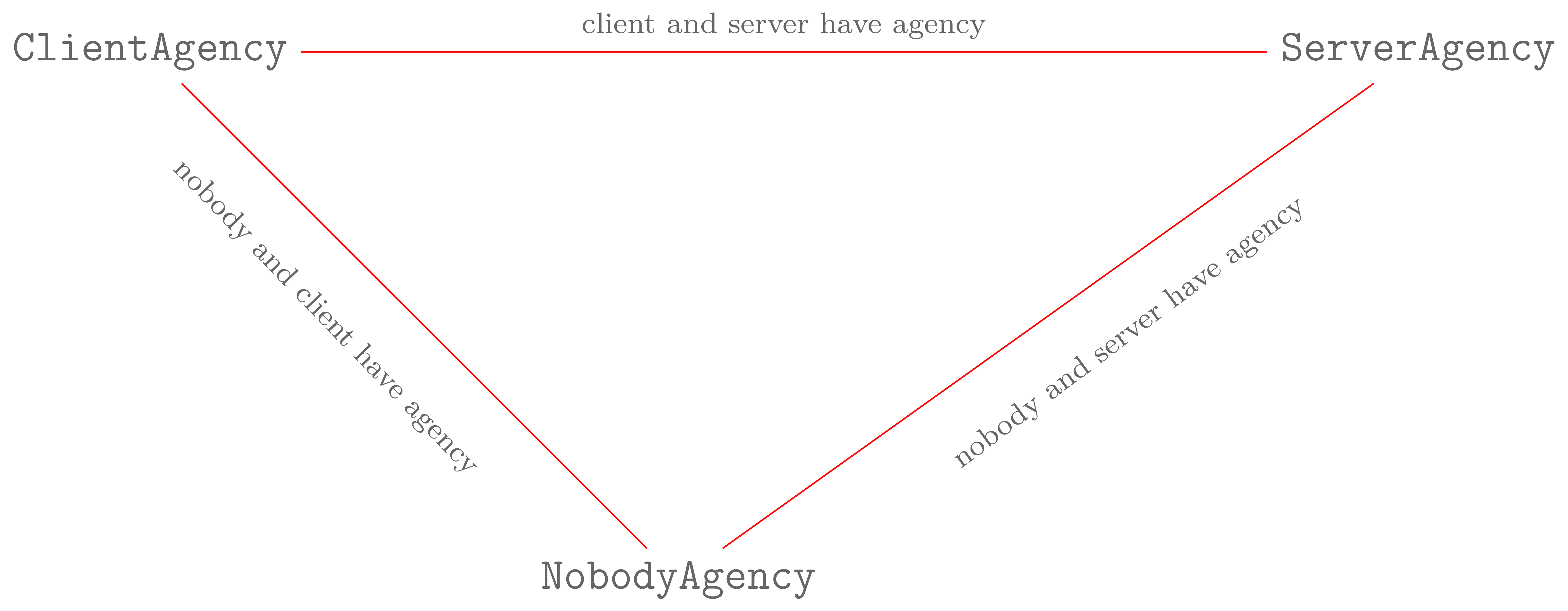
Pipelining with type level queue
We already seen that pipelining requires a queue that allows to send more messages before waiting for the replies. But it does not necessarily needs to be a term level queue, equally well we could push the expected transitions on a type level queue, and give a way to collect responses and thus eliminate from the type level queue.
Queue kind
First let us define elements that will be pushed on to the queue.
When we just send some Message pt from to and we want to
pipeline next message Message from' to', we will push
Tr to from' onto the queue. The
Tr to from' :: Trans ps is a promoted type which allows us
to track delayed transitions.
data Trans ps where
Tr :: forall ps. ps -> ps -> Trans psWe represent the type level queue with type level list.
<| and Empty are simply type aliases, we
also provide a snoc operator |> which we will use to
push elements onto the queue.
-- | Queue kind
--
data Queue ps where
Empty :: Queue ps
Cons :: Trans ps -> Queue ps -> Queue ps
-- | Cons type alias
--
type (<|) :: Trans ps -> Queue ps -> Queue ps
type a <| as = Cons a as
infixr 5 <|
-- | Snoc operator
--
type (|>) :: Queue ps -> Trans ps -> Queue ps
type family as |> b where
Empty |> b = Cons b Empty
(a <| as) |> b = a <| (as |> b)
infixr 5 |>Peer
The PeerPiplined type is a general API for building
protocol applications which satisfy the Protocol type class
constraint. Unlike our previous examples it can be used to build either
client or server roles. The client and server build with it are
necessarily dual to each other, see theorem_duality below.
It also supports any monad and can embed any monadic computations.
-- | Promoted data type which indicates if 'Peer' is used in
-- pipelined mode or not.
--
data Pipelined = NonPipelined | Pipelinedtype Peer :: forall ps
-> PeerRole
-> Pipelined
-> Queue ps
-> ps
-> (Type -> Type)
-> Type
-> Type
data Peer ps pr pl q st m a where
-- | 'Effect' allows to introduce monadic effects.
--
Effect
:: m (Peer ps pr pl q st m a)
-> Peer ps pr pl q st m a
-- | Non-pipelined send. One needs to present proof of agency, message
-- to be send and a continuation. One cannot send
-- non-pipelined messages when there are outstanding requests. This is
-- enforced by requiring that the queue is empty.
--
Yield
:: !(WeHaveAgency pr st)
-> Message ps st st'
-> Peer ps pr pl Empty st' m a
-> Peer ps pr pl Empty st m a
-- | Await for a non-pipelined message. One has to present a proof that
-- one does not have agency and a continuation function which can deal
-- with any message that might arrive from the network.
--
Await
:: !(TheyHaveAgency pr st)
-> (forall st'. Message ps st st'
-> Peer ps pr pl Empty st' m a)
-> Peer ps pr pl Empty st m a
-- | Terminate the protocol.
--
Done
:: !(NobodyHasAgency st)
-> a
-> Peer ps pr pl Empty st m a
--
-- Pipelining primitives
--
-- | Pipelined send which. Note that the continuation decides from which
-- state we pipeline next message, and the gap is pushed at the back of
-- the queue.
--
YieldPipelined
:: !(WeHaveAgency pr st)
-> Message ps st st'
-> Peer ps pr 'Pipelined (q |> Tr st' st'') st'' m a
-> Peer ps pr 'Pipelined q st m a
-- | Partially collect promised transition.
--
Collect
:: Maybe (Peer ps pr 'Pipelined (Tr st' st'' <| q) st m a)
-> !(TheyHaveAgency pr st')
-> (forall stNext. Message ps st' stNext
-> Peer ps pr 'Pipelined (Tr stNext st'' <| q) st m a)
-> Peer ps pr 'Pipelined (Tr st' st'' <| q) st m a
-- | Collect the identity transition.
--
-- 'CollectDone' allows to defer popping @Tr ps st st@ from the queue
-- after a message is received (in 'Collect' callback), unlike 'Collect'
-- which needs to know the transition type at compile time.
--
CollectDone
:: Peer ps pr 'Pipelined q st m a
-> Peer ps pr 'Pipelined (Tr st st <| q) st m aPingPong protocol
In this section we will formalise the ping pong protocol by providing
Protocol instance.

instance Protocol PingPong where
-- | Ping pong messages
--
data Message PingPong from to where
MsgPing :: Message PingPong StIdle StBusy
MsgPong :: Message PingPong StBusy StIdle
MsgDone :: Message PingPong StIdle StDone
data ClientHasAgency st where
TokIdle :: ClientHasAgency StIdle
data ServerHasAgency st where
TokBusy :: ServerHasAgency StBusy
data NobodyHasAgency st where
TokDone :: NobodyHasAgency StDone
-- exclusion lemmas, which prove that n each state at most one of server, or
-- client has agency.
exclusionLemma_ClientAndServerHaveAgency TokIdle tok = case tok of {}
exclusionLemma_NobodyAndClientHaveAgency TokDone tok = case tok of {}
exclusionLemma_NobodyAndServerHaveAgency TokDone tok = case tok of {}Some auxiliary instances:
deriving instance Show (Message PingPong from to)
deriving instance Show (ClientHasAgency (st :: PingPong))
deriving instance Show (ServerHasAgency (st :: PingPong))Non-pipelined ping pong client
-- A non-pipelined PingPong.
--
pingPongClient
:: a -> Peer PingPong AsClient NonPipelined Empty StIdle m a
pingPongClient a =
-- send ping message
Yield (ClientAgency TokIdle) MsgPing
-- await for the response
$ await
$ Yield (ClientAgency TokIdle) MsgPing
$ await
$ -- send terminating message
Yield (ClientAgency TokIdle) MsgDone
-- return
$ Done TokDone a
where
-- await for all 'MsgPong' until first 'MsgPongDone'
await :: Peer PingPong AsClient NonPipelined Empty StIdle m a
-> Peer PingPong AsClient NonPipelined Empty StBusy m a
await k =
Await (ServerAgency TokBusy) $ \msg ->
case msg of
MsgPong -> kPipelined ping pong client
-- A pipelined 'PingPong', without partial collects.
--
pingPongClientPipelined
:: a -> Peer PingPong AsClient 'Pipelined Empty StIdle m a
pingPongClientPipelined a =
-- pipeline three pings
YieldPipelined (ClientAgency TokIdle) MsgPing
$ YieldPipelined (ClientAgency TokIdle) MsgPing
$ YieldPipelined (ClientAgency TokIdle) MsgPing
-- collect three pongs
$ collect
$ collect
$ collect
$ Yield (ClientAgency TokIdle) MsgDone
-- return from the protocol
$ Done TokDone a
where
collect :: Peer PingPong AsClient 'Pipelined q StIdle m a
-> Peer PingPong AsClient 'Pipelined
(Tr StBusy StIdle <| q) StIdle m a
collect k =
Collect Nothing (ServerAgency TokBusy)
$ \msg -> case msg of
MsgPong -> CollectDone kPingPong2 protocol
Let us consider a variation of the ping pong protocol, in which the
server might send multiple MsgBusy before transferring
agency back to the client with MsgPong. In this version by
pipelining MsgPing, we might need to collect multiple
MsgBusy until we receive MsgPong. It will help
us demonstrate that we can pipeline multiple MsgPing
messages and collect all the replies.
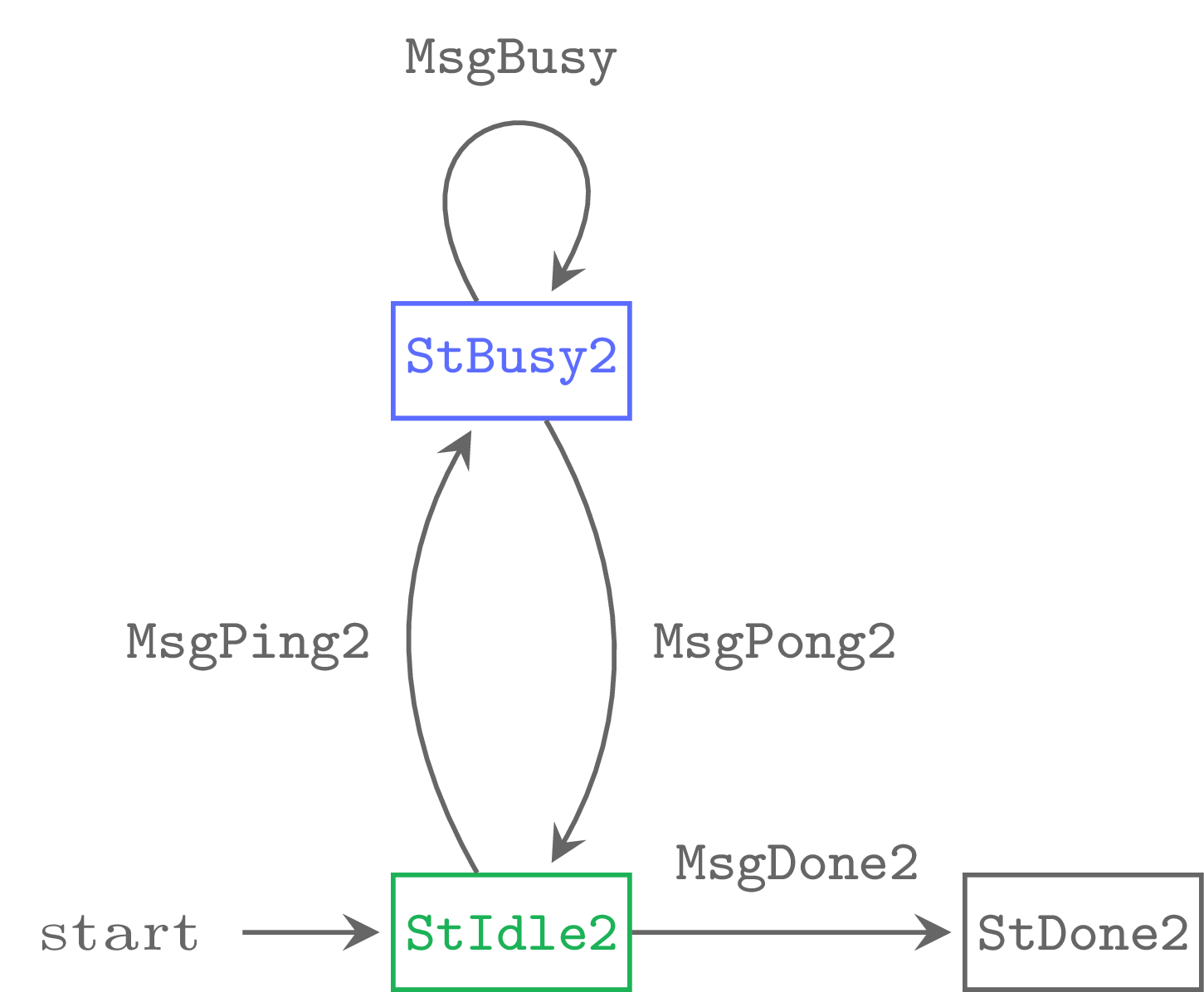
-- | PingPong2 has the same state machine, although we will a different
-- `Protocol` instance. For that reason we provide a newtype wrapper and
-- use type aliases.
--
newtype PingPong2 = Wrap PingPong
type StIdle2 = Wrap StIdle
type StBusy2 = Wrap StBusy
type StDone2 = Wrap StDoneinstance Protocol PingPong2 where
data Message PingPong2 from to where
-- | 'PingPong' message
MsgPingPong :: Message PingPong st st'
-> Message PingPong2 (Wrap st) (Wrap st')
-- | new message
MsgBusy :: Message PingPong2 (Wrap StBusy) (Wrap StBusy)
data ClientHasAgency st where
WrapClient :: ClientHasAgency st
-> ClientHasAgency (Wrap st)
data ServerHasAgency st where
WrapServer :: ServerHasAgency st
-> ServerHasAgency (Wrap st)
data NobodyHasAgency st where
WrapDone :: NobodyHasAgency st
-> NobodyHasAgency (Wrap st)
-- We haven't changed the states and their agencies, so we can reuse
-- 'PingPong' lemmas.
exclusionLemma_ClientAndServerHaveAgency (WrapClient tok) (WrapServer tok') =
exclusionLemma_ClientAndServerHaveAgency tok tok'
exclusionLemma_NobodyAndClientHaveAgency (WrapDone tok) (WrapClient tok') =
exclusionLemma_NobodyAndClientHaveAgency tok tok'
exclusionLemma_NobodyAndServerHaveAgency (WrapDone tok) (WrapServer tok') =
exclusionLemma_NobodyAndServerHaveAgency tok tok'Some auxiliary instances:
deriving instance Show (Message PingPong2 from to)
deriving instance Show (ClientHasAgency (st :: PingPong2))
deriving instance Show (ServerHasAgency (st :: PingPong2))Pipelined ping pong
client using Collect
-- | A pipelined 'PingPong' which supports partial collects using the
-- recursive 'collect'.
--
pingPongClientPipelined2
:: a
-> Peer PingPong2 AsClient 'Pipelined Empty StIdle2 m a
pingPongClientPipelined2 a =
-- pipeline three 'MsgPing'
YieldPipelined (ClientAgency (WrapClient TokIdle)) (MsgPingPong MsgPing)
$ YieldPipelined (ClientAgency (WrapClient TokIdle)) (MsgPingPong MsgPing)
$ YieldPipelined (ClientAgency (WrapClient TokIdle)) (MsgPingPong MsgPing)
-- collect responses
$ collect
$ collect
$ collect
$ Yield (ClientAgency (WrapClient TokIdle)) (MsgPingPong MsgDone)
$ Done (WrapDone TokDone) a
where
-- recursively collect responses, until 'MsgPongDone2' is received
collect :: Peer PingPong2 AsClient 'Pipelined q StIdle2 m a
-- ^ continuation after removing @Tr StBusy2 StIdle2@ from the
-- queue
-> Peer PingPong2 AsClient 'Pipelined
(Tr StBusy2 StIdle2 <| q) StIdle2 m a
collect k =
Collect Nothing (ServerAgency (WrapServer TokBusy))
$ \msg -> case msg of
MsgBusy -> collect k
(MsgPingPong MsgPong) -> CollectDone kNext example is similar to the previous one but it counts the number
of MsgBusy received.
pingPongClientPipelined2Counter
:: Peer PingPong2 AsClient 'Pipelined Empty StIdle2 m Int
pingPongClientPipelined2Counter =
-- pipeline three 'MsgPing2'
YieldPipelined (ClientAgency (WrapClient TokIdle)) (MsgPingPong MsgPing)
$ YieldPipelined (ClientAgency (WrapClient TokIdle)) (MsgPingPong MsgPing)
$ YieldPipelined (ClientAgency (WrapClient TokIdle)) (MsgPingPong MsgPing)
-- collect responses, and count received 'MsgBusy'
$ collect 0
$ \n1 -> collect n1
$ \n2 -> collect n2
$ \n3 -> Yield (ClientAgency (WrapClient TokIdle)) (MsgPingPong MsgDone)
$ Done (WrapDone TokDone) n3
where
-- recursively collect responses, until 'MsgPongDone2' is received
collect
:: Int
-- ^ number of 'MsgBusy' received so far
-> (Int -> Peer PingPong2 AsClient 'Pipelined q StIdle2 m Int)
-- ^ continuation after removing @Tr StBusy2 StIdle2@ from the
-- queue
-> Peer PingPong2 AsClient 'Pipelined
(Tr StBusy2 StIdle2 <| q) StIdle2 m Int
collect !n k =
Collect Nothing (ServerAgency (WrapServer TokBusy))
$ \msg -> case msg of
MsgBusy -> collect (n+1) k
(MsgPingPong MsgPong) -> CollectDone (k n)Duality
Duality assures that two peers in dual roles: AsClient
vs AsServer can run a protocol without deadlock. We also
prove that if a protocol will terminate both sides will end at a common
terminal state (one of the states in which
NobodyHasAgency). The proofs holds under the assumption
that the encoding of messages is 1-1, if this assumption is not true it
is possible that an application will not terminate when reaching a
terminal state, or that it will terminate early causing the other side
to deadlock. There are situations when non injective codecs are useful,
and these cases require additional care.
Duality for non-pipelined protocols
First we start with duality for non-pipelined protocols, as this is quite a bit simpler. The code below is copy-paste from typed-protocols package (with small adjustments).
data TerminalStates ps where
TerminalStates :: forall ps (st :: ps) (st' :: ps).
NobodyHasAgency st
-> NobodyHasAgency st'
-> TerminalStates ps
theorem_nonpipelined_duality
:: forall ps (pr :: PeerRole) (initSt :: ps) m a b.
( Monad m, Protocol ps)
=> Peer ps pr NonPipelined Empty initSt m a
-> Peer ps (FlipAgency pr) NonPipelined Empty initSt m b
-> m (a, b, TerminalStates ps)
theorem_nonpipelined_duality = go
where
go :: forall (st :: ps).
Peer ps pr NonPipelined Empty st m a
-> Peer ps (FlipAgency pr) NonPipelined Empty st m b
-> m (a, b, TerminalStates ps)
go (Done stA a) (Done stB b) = return (a, b, TerminalStates stA stB)
go (Effect a ) b = a >>= \a' -> go a' b
go a (Effect b) = b >>= \b' -> go a b'
go (Yield _ msg a) (Await _ b) = go a (b msg)
go (Await _ a) (Yield _ msg b) = go (a msg) b
-- By appealing to the proofs about agency for this protocol we can
-- show that these other cases are impossible
go (Yield (ClientAgency stA) _ _) (Yield (ServerAgency stB) _ _) =
absurd (exclusionLemma_ClientAndServerHaveAgency stA stB)
go (Yield (ServerAgency stA) _ _) (Yield (ClientAgency stB) _ _) =
absurd (exclusionLemma_ClientAndServerHaveAgency stB stA)
go (Await (ClientAgency stA) _) (Await (ServerAgency stB) _) =
absurd (exclusionLemma_ClientAndServerHaveAgency stA stB)
go (Await (ServerAgency stA) _) (Await (ClientAgency stB) _) =
absurd (exclusionLemma_ClientAndServerHaveAgency stB stA)
go (Done stA _) (Yield (ServerAgency stB) _ _) =
absurd (exclusionLemma_NobodyAndServerHaveAgency stA stB)
go (Done stA _) (Yield (ClientAgency stB) _ _) =
absurd (exclusionLemma_NobodyAndClientHaveAgency stA stB)
go (Done stA _) (Await (ServerAgency stB) _) =
absurd (exclusionLemma_NobodyAndServerHaveAgency stA stB)
go (Done stA _) (Await (ClientAgency stB) _) =
absurd (exclusionLemma_NobodyAndClientHaveAgency stA stB)
go (Yield (ClientAgency stA) _ _) (Done stB _) =
absurd (exclusionLemma_NobodyAndClientHaveAgency stB stA)
go (Yield (ServerAgency stA) _ _) (Done stB _) =
absurd (exclusionLemma_NobodyAndServerHaveAgency stB stA)
go (Await (ClientAgency stA) _) (Done stB _) =
absurd (exclusionLemma_NobodyAndClientHaveAgency stB stA)
go (Await (ServerAgency stA) _) (Done stB _) =
absurd (exclusionLemma_NobodyAndServerHaveAgency stB stA)Removing pipelining
We can show that any peer that is using pipelining primitives can be
transformed into non-pipelined version. This is possible because
pipelining does not changes the order of messages sent or received. We
just need to track this order with PrQueue. First we define
various singletons needed to track the evolution of types.
-- | Singletons for types of kind `Trans`.
--
type STrans :: Trans ps -> Type
data STrans tr where
STr :: STrans (Tr st st')
-- | Singleton for types of kind `Queue` kind.
---
type SQueue :: Queue ps -> Type
data SQueue q where
SEmpty :: SQueue Empty
SCons :: STrans (Tr st st') -> SQueue q -> SQueue (Tr st st' <| q)
-- | `PrQueue` tracks the order of transitions. We either have an
-- explicit `Message` or a `STrans` singleton, both are pushed by
-- `YieldPipelined` operation.
--
-- Note: if not the order of arguments 'PrQueue' could be given a category
-- instance
type PrQueue :: forall ps -> PeerRole -> ps -> Queue ps -> ps -> Type
data PrQueue ps pr st q st' where
ConsMsgQ :: WeHaveAgency pr st
-> Message ps st st'
-> PrQueue ps pr st' q st''
-> PrQueue ps pr st q st''
ConsTrQ :: STrans (Tr st st')
-> PrQueue ps pr st' q st''
-> PrQueue ps pr st (Tr st st' <| q) st''
EmptyQ :: PrQueue ps pr st Empty st
-- | Push a `ConsMsgQ` to the back of `PrQueue`.
--
snocMsgQ :: WeHaveAgency pr st'
-> Message ps st' st''
-> PrQueue ps pr st q st'
-> PrQueue ps pr st q st''
snocMsgQ stok msg (ConsMsgQ stok' msg' pq) =
ConsMsgQ stok' msg' (snocMsgQ stok msg pq)
snocMsgQ stok msg (ConsTrQ str pq) =
ConsTrQ str (snocMsgQ stok msg pq)
snocMsgQ stok msg EmptyQ =
ConsMsgQ stok msg EmptyQ
-- | Push a `STrans (Tr st st')` to the back of `PrQueue`.
--
snocTrQ :: STrans (Tr st' st'')
-> PrQueue ps pr st q st'
-> PrQueue ps pr st (q |> Tr st' st'') st''
snocTrQ tr (ConsMsgQ stok msg pq) =
ConsMsgQ stok msg (snocTrQ tr pq)
snocTrQ tr (ConsTrQ tr' pq) =
ConsTrQ tr' (snocTrQ tr pq)
snocTrQ tr EmptyQ =
ConsTrQ tr EmptyQWith all the singletons at hand we are ready to prove:
theorem_unpipeline
:: forall ps (pr :: PeerRole) (pl :: Pipelined) (initSt :: ps) m a.
Functor m
=> [Bool]
-- ^ interleaving choices for pipelining allowed by
-- `Collect` primitive. False values or `[]` give no
-- pipelining.
-> Peer ps (pr :: PeerRole) pl Empty initSt m a
-> Peer ps pr NonPipelined Empty initSt m a
theorem_unpipeline cs0 = go cs0 EmptyQ
where
go :: [Bool]
-> PrQueue ps pr st q st'
-> Peer ps pr pl q st' m a
-> Peer ps pr 'NonPipelined Empty st m a
go cs pq (Effect k) = Effect $ go cs pq <$> k
go cs EmptyQ (Yield stok msg k) = Yield stok msg $ go cs EmptyQ k
go cs EmptyQ (Await stok k) = Await stok $ go cs EmptyQ . k
go _ EmptyQ (Done stok a) = Done stok a
go cs pq (YieldPipelined stok msg k) =
-- push message and promised transition to `PrQueue`.
go cs ( pq
& snocMsgQ stok msg
& snocTrQ STr
)
k
go cs (ConsMsgQ stok msg pq) k = Yield stok msg $ go cs pq k
go (True:cs') pq (Collect (Just k) _ _) =
go cs' pq k
go cs (ConsTrQ _ pq) (Collect _ stok k) =
Await stok $ go cs (ConsTrQ STr pq) . k
go cs (ConsTrQ _ pq) (CollectDone k) =
go cs pq kDuality for pipelined protocols
The proof of our main theorem is a straight forward consequence of our earlier results:
theorem_duality
:: forall ps (pr :: PeerRole) (pl :: Pipelined) (st :: ps) m a b.
( Monad m, Protocol ps )
=> [Bool]
-> [Bool]
-> Peer ps pr pl Empty st m a
-> Peer ps (FlipAgency pr) pl Empty st m b
-> m (a, b, TerminalStates ps)
theorem_duality csA csB a b =
theorem_nonpipelined_duality (theorem_unpipeline csA a)
(theorem_unpipeline csB b)Alternative Agda implementation
There is available an alternative implementation of typed-protocols
in Agda, see here. The Agda
implementation has a nicer interface. The Haskell implementation needs
to provide Protocol instance, which
requires to define:
- message type
- agency singletons for each state
- a set of three proofs that verify that a state singleton is provided
for only one agency type: either
ClientHasAgency,ServerHasAgency,NobodyHasAgency.
The Agda implementation however makes an explicit distinction between
objective agency (ClientAgency, ServerAgency,
NobodyAgency) and a relative agency
(WeHaveAgency, TheyHaveAgency,
NobodyHasAgency), and is indexed over:
- message type
- a (type level) function from states to the objective agency
The exclusion lemmas are proven for all protocols which are provided
with this interface. One still needs to provide agency witnesses for
Peer primitives, but they one only can provide them with
propositional equality _≡_ (which is equivalent to
Haskell’s :~:), and hence simpler to use.
The simplification found in Agda implementation is a future possible improvement in typed-protocols.